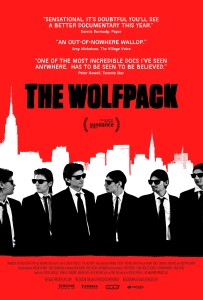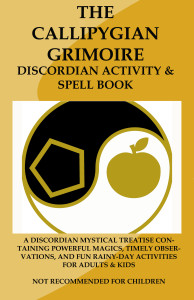 The Wolfpack is clearly intended as one of those “reality is stranger than fiction” documentaries, but I don’t really buy it. The movie tells the story of the six Angulo brothers (Bhagavan, Govidnda, Jagadisa, Krsna, Mukunda, and Narayana), who live with their mother, father, and sister in a 4-bedroom apartment on New York’s Lower East Side. According to the film, the boys (and their mother and sister) are only allowed to leave the apartment a few times a year (and during one stretch were kept locked in the apartment for over year). The boys spend their time in the apartment remaking their favorite movies. When one of the brothers sneaks out, everything changes and eventually the others start going outside on their own and become the subjects of a documentary that generates a ton of buzz.
The Wolfpack is clearly intended as one of those “reality is stranger than fiction” documentaries, but I don’t really buy it. The movie tells the story of the six Angulo brothers (Bhagavan, Govidnda, Jagadisa, Krsna, Mukunda, and Narayana), who live with their mother, father, and sister in a 4-bedroom apartment on New York’s Lower East Side. According to the film, the boys (and their mother and sister) are only allowed to leave the apartment a few times a year (and during one stretch were kept locked in the apartment for over year). The boys spend their time in the apartment remaking their favorite movies. When one of the brothers sneaks out, everything changes and eventually the others start going outside on their own and become the subjects of a documentary that generates a ton of buzz.
The Wolfpack isn’t a mockumentary. The Angulos are definitely a real family, they’ve got nine people crammed into a small apartment in New York, and the boys spend their time remaking movies. There’s too much old home movie footage to deny that the basics are all true. It’s the part about being virtual prisoners that seems to be exaggerated. There are a few practical questions, like where they get all the craft supplies to make their props and costumes (including a full Batsuit) if, as we’re led to believe, the only time anyone ever leaves the house is when their father goes out for groceries every three or four weeks. Or for that matter, why would a presumably poor family (the father is philosophically opposed to work, so their only income is what their mother gets paid for home-schooling the kids) buy suits for kids who never leave the house?
Maybe the boys need those suits for one of their occasional outings, but there’s no way for us to know since they never talk about what they did when they were allowed to leave the apartment. You’d think that these rare trips outside would be major events for kids who spent most of their life locked up in a small apartment. The fact that the boys never mention their trips outside and the filmmakers never bother to ask about them seems like a suspiciously serious oversight. You just don’t really notice while you’re watching because the entire film is light on the details necessary to support the narrative that’s being sold. For probably the first half hour, it’s not even entirely clear whether or not the boys’ father is still alive. Most of the movie is made up of scenes that give the impression of telling a story without really revealing anything new or adding any meaning to what we already know.
Nowhere are the necessary narrative details more obviously missing than at what we’re told is the turning point of the movie, when 15-year-old Mukunda sneaks out of the apartment, blazing the trail that will eventually lead to the other boys venturing into the outside world and the family moving toward a more normal life. According to the official story, Mukunda snuck out while his father was out getting groceries, wearing a homemade Michael Myers mask so his father wouldn’t recognize him if they ran into one another. This creeped people out and eventually somebody called the police. Mukunda was carted off to a mental hospital for an unspecified amount of time.
AND THEN EVERYBODY WENT OUTSIDE AND LIFE WAS NORMAL!
Did you see that oil tanker? It was driving through the plot hole that you don’t really notice when you’re watching the film but that becomes pretty obvious when you start thinking about it on the drive home. Even if believe that the kid’s had too little experience with the outside world to realize that a serial killer mask would freak people out, it seems extremely unlikely that even a sheltered 15 year-old would believe he could fool his father by wearing a homemade mask that his father has almost certainly seen before. It’s also extremely unclear how Mukunda’s being arrested and held in a mental hospital would be seen by the other kids as a successful outing. We’re led to believe that the experience left Mukunda–who according to the official story had never before been separated from his family–largely unchanged except for being more angry at his father and ready to lead the other kids out into the big, bright world where they could…get…arrested?…. and sent to a…mental ward?
Another thing that makes it hard to accept the movie’s narrative as completely true is the boys themselves. They seem surprisingly articulate for kids with limited interaction outside of their family, especially considering that their mother, who home-schooled them, doesn’t seem particularly intelligent and their father’s native language isn’t English. They also seem extremely comfortable with the documentarians, and there’s a strong sense that they’re performing for the cameras. That would make sense if it were just cameras–after all, they’ve spent most of their lives making home movies. But there’s a stranger behind the camera and these boys, we’re told, have rarely interacted with anyone outside of their family, so you’d expect at least a little nervousness. Even if we assume that there’s some unseen footage where the boys are awkward and shy, and that they quickly formed a bond with the director, it seems unusual that none of that early footage–which would have presumably included the very first time the boys established some sort of trust with someone outside the family–was compelling enough to use in the film.
Despite the many questions about its authenticity, The Wolfpack is an enjoyable movie to watch. There’s a “too weird to be for real” vibe, but the film is put together in a way that glosses over and directs the audience away from the holes in the story, at least while the movie’s playing. You really only start to question things later, but once you do it’s hard not to feel like the real story of the Angulos has been heavily dramatized to create an engaging film. It’s the kind of “reality” that you normally expect more from something like Ducky Dynasty than a winner of a Sundance award for documentary film.
-
The Wolfpack
Summary
Very entertaining, but I’m not sure that “documentary” is the right word for it.




















































Comments
Add a Comment